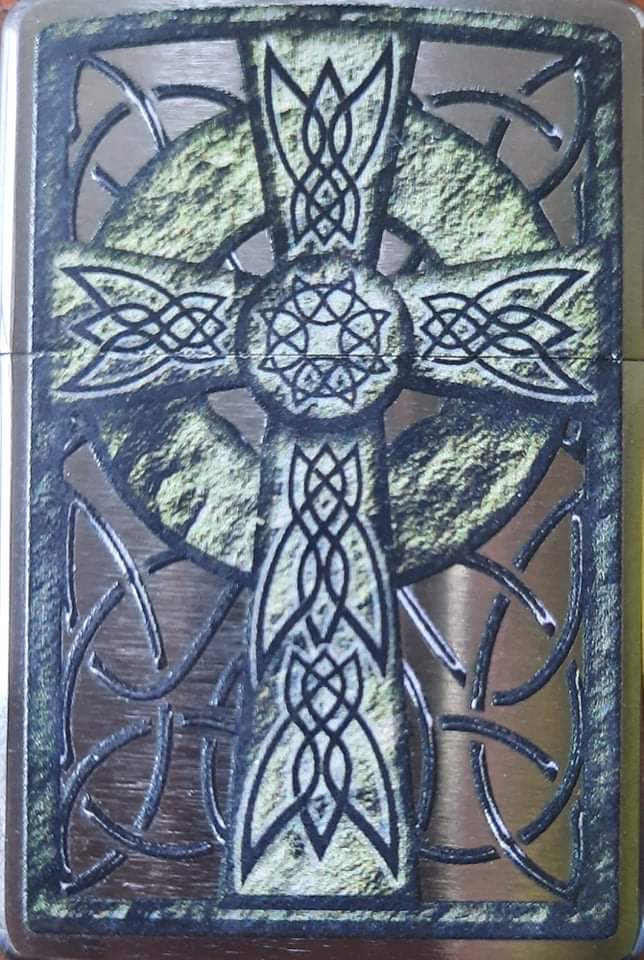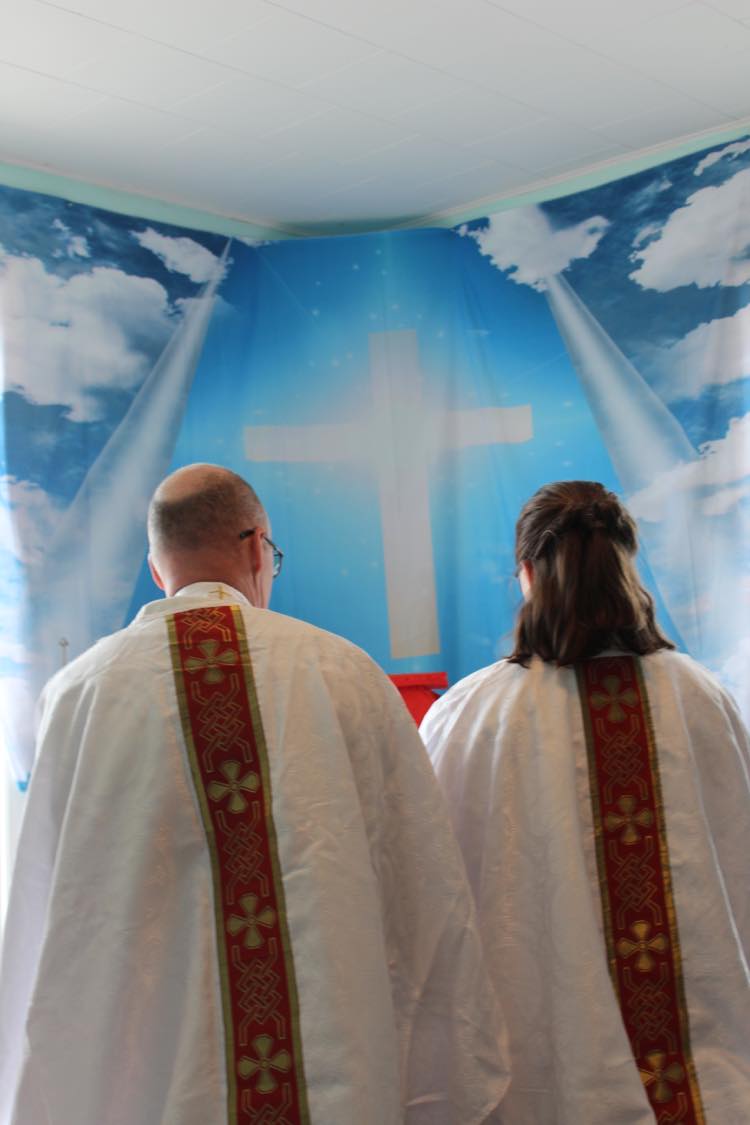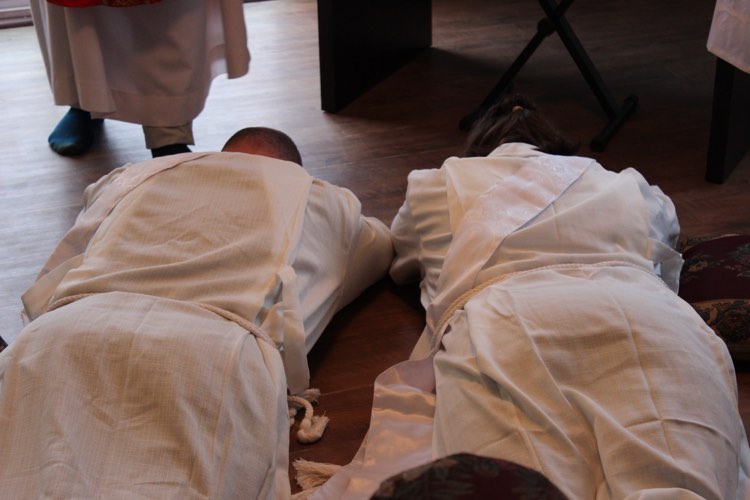- Home
- simply catholic
- Catholic Sacraments
- Last Rites
Simply Catholic and Welcoming You
Catholic Last Rites in St. Brigit’s Community Catholic Church

A Celtic Cross, often seen as a grave marker or headstone
Catholic Churches, including St. Brigit’s Community Catholic Church, teach that sacraments are outward signs of inward grace, instituted by Christ for our sanctification. While God gives grace to man without outward symbols (sacraments), He has also chosen to give grace to man through visible symbols.
"The Catholic Last Rites" refers to the sacrament that Catholics receive at the end of their lives, specifically this includes, Confession, Holy Communion, and the Anointing of the Sick, and the prayers accompanying each, especially the Apostolic Pardon.
While Catholic Last Rites is sometimes used to refer to only one of the seven sacraments, the Sacrament of the Anointing of the Sick, that application is technically incorrect. The Anointing of the Sick is technically part of Last Rites rather than Last Rites itself. Continually referring to the Anointing of the Sick as the Last Rites creates confusion and keeps people from seeking Blessings/Anointings of the Sick.
The Anointing of the Sick
The Anointing of the Sick is a sacramental Blessing that can be administered to anyone who is facing any kind of health challenge. They do NOT need to be at risk of death to receive this Blessing. (Indeed people may receive priesthood Blessings at any time to assist them with any of the challenges of life that they are facing be that careers, school, marriage or other relationships, etc.)
Many people are reluctant to receive a Blessing/Anointing of the Sick because they have come to believe that this means they are dying or that they have to be dying to get this Blessing. Absolutely not true. Let's say you need an operation. It's not life threatening, you're simply concerned about being laid up and how long it takes to heal, that's cause for a Blessing.
Someone has a fever, broke a bone, finds out they have a lifelong condition or disability. All these call for a Blessing/Anointing of the Sick. (School exams coming up, perhaps changing schools or careers, all these and more are cause for a Priesthood Blessing though this does not involve an anointing and is clearly not a blessing of the sick.) It's about keeping Christ at the center of our lives. As for those who think they are "imposing" on the priest; good Lord No! You are providing the priest with opportunities to magnify their priesthood calling.
When anyone seeks to bless someone else's life they are Blessed in return. When a priest is asked to administer a Blessing, the priest is also Blessed. Please, never be reluctant to engage the priesthood in your life.
The Catechism of the Catholic Church describes Holy Viaticum as “The Last Sacrament of the Christian.” As such it constitutes “the seed of eternal life and the power of resurrection” as revealed by the Lord Jesus in the words: “He who eats my flesh and drinks my blood has eternal life, and I will raise him up at the last day.” (John 6:54). For this reason, it is important for a Catholic who is about to leave this world to receive the Eucharist as Viaticum.
Catholic Last Rites and the Apostolic Pardon
As a person draws closer to the doors of death, there is one blessing in particular that the Catholic Church, including St. Brigit’s Community Catholic Church, reserves for this most sacred moment: the Apostolic Pardon, which is a part of the Last Rites. It is a pardon that can be given by any priest and has the special power of removing all temporal punishment due to sin.
The Apostolic Pardon is a blessing with an indulgence that happens at the conclusion of the anointing of the sick if the recipient is in danger of death.
It is a beautiful prayer and is meant to speed the penitent soul to the gates of Heaven, removing the punishment due to sin that they have already confessed, or at the very least, have fully repented from in their hearts. It does not guarantee someone will go straight to Heaven, but it clears everything off the road, so to speak, so that the soul can freely choose to run toward the arms of Jesus.
The prayer is a supreme act of mercy and has great power, drawing on the authority given to the church to “bind and loose” (Matthew 16:19). It is a gift to a soul on their deathbed and has the added benefit of giving peace to family and friends, assuring them that they have done all they could do to bring a soul closer to the gates of Paradise.
So what is this The Apostolic Pardon prayer?
There are two prayers said one right after the other. The first prayer also acts as an explanation of what the pardon imparts.
"Through the Holy Mysteries of our redemption, may Almighty God release you from all punishments in this life and in the life to come. May He open to you the gates of Paradise and welcome you to everlasting Joy."
“By the authority which the Apostolic See has given me, I grant you a full pardon and the remission of all your sins in the name of the Father, and of the Son, and of the Holy Spirit. Amen.”
Simple yet profound.
In the face of death, the Church confidently proclaims that God has created each person for eternal life and that Jesus, the Son of God, by His death and resurrection, has broken the chains of sin and death that bound humanity. Christ “achieved His task of redeeming humanity and giving perfect glory to God, principally by the paschal mystery of His blessed passion, resurrection from the dead, and glorious ascension.”
Likewise and by extension, Christians celebrate the Funeral Rites to offer worship, praise, and thanksgiving to God for the gift of a life which has now been returned to God, the author of life and the hope of the just. The Mass, the Memorial of Christ’s death and Resurrection, is the principal celebration of the Christian funeral.
The Church through its Funeral Rites commends the dead to God’s merciful love and pleads for the forgiveness of their sins. At the Funeral Rites, especially at the celebration of the Eucharistic sacrifice, the Christian community affirms and expresses the union of the Church on earth with the Church in heaven in the one great Communion of Saints. Though separated from the living, the dead are still at one with the community of believers on earth and benefit from their prayers and intercession.
At the Rite of Final Commendation and Farewell, the community acknowledges the reality of separation and commends the deceased to God. In this way it recognizes the spiritual bond that still exists between the living and the dead and proclaims its belief that all the faithful will be raised up and reunited in the new heavens and a new earth, where death will be no more.
The celebration of the Christian funeral brings hope and consolation to the living.
Recent Articles
-
Catholic-Confession
Apr 19, 25 08:53 PM
Full breakdown of the Catholic Confession Sacrament of Reconciliation -
Ordination, incardination and dismissal of clergy
Mar 03, 25 06:47 PM
Overview of Ordination to Holy Orders, incardination and dismissal of clergy -
Catholic Last Rites
Mar 03, 25 06:41 PM
An explanation of the Catholic Last Rites and Anointing of the Sick

